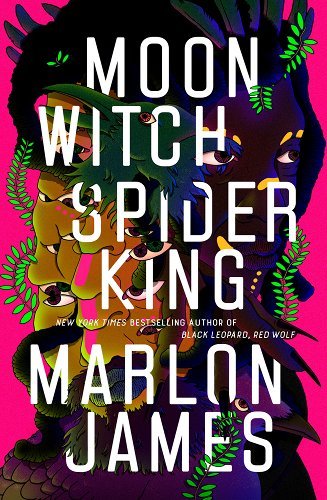Marlon James’ drive to explore African mythology—beyond boyhood Anansi stories in Jamaica—required a “fact-finding mission to find my own history.” In a New York Times interview, he expresses his desire to create an “electrifying” story: his Dark Star trilogy. Assuming multiple roles—anthropologist, archeologist, historian, skeptic, and scholar of religion—to develop the shapeshifters, vampires, and other chaotic characters who populate his newest release Moon Witch, Spider King, James extends the panoramic violence that characterizes his fiction.
“What kind of monster kills a baby? What kind of demon lets him die?” This trilogy could be viewed as responding to these questions posed in James’ 2009’s The Book of Night Women. The trilogy’s first narrator in 2019’s Black Leopard, Red Wolf, Tracker, claims he “did nothing but try to find a boy.” Sogolon, the trilogy’s second narrator in 2022’s Moon Witch, Spider King, is also preoccupied by the boy’s fate: “Bad circumstances fall on the boy, they say, as if somebody didn’t drop those circumstances on him.”
Perspective is everything: “Is this golden boy the fish or the bait?” James previously exhibited this talent in 2014’s A Brief History of Seven Killings, a kaleidoscope of first-person narrative shaped into a “novel that would be driven only by voice” as described in his acknowledgements; the Dark Star trilogy, by contrast, is a chorus of voices.
Readers investigate shifting perspectives as narrators offer testimony to an Inquisitor. Tracker ends his account by asking: “Did she say, Trust no word coming from the lips of that Wolf-Eye? Tell me.” Sogolon elaborates: “…if I leave it to just him, then the only story of this business will be the Tracker’s, and that silly, slutty fool don’t even know that this tale is not just bigger than him, but one hundred seventy and seven years older.”
Conflict fuels the trilogy, too. Tracker asks: “What does the bearer do with the thing he can’t bear, throw it off?” Sogolon observes that she “was looking for anything to squeeze into the space that hate was carving out.” Mythology explores archetypal battles: “And so go the times of war, until the old names for the north and south kingdoms, the names of the two boys get lost to all but the southern griots and the forgotten gods.”
Discrepancies invite commentary on truth/lies, history/narrative, and experience/memory. These themes have preoccupied James since his 2005 debut, John Crow’s Devil: “After six years, false story and true story rub together so much that both start shine.”
The rub between volumes isn’t repetition but recalibration; readers assemble understanding in the reverberation between narratives. For Tracker, the “ground was right now not the ground, and the sky was not the sky, and lie was truth and truth was a shifting, slithering thing” and, for Sogolond, time passes and “this little girl see that nothing that come out of the mouth of these brothers could ever pass as true, not even if they say the water is wet and the fire is hot.”
Moon Witch, Spider King also questions men’s shaping of women’s stories: “Tell me what it mean that my memory is of a man telling me what my life was and me choosing to believe it….” Being “but air to everybody” is a disadvantage, but Sogolond’s invisibility also creates opportunities, and the cook reminds readers: “The only difference between who is a witch and who is not is one man’s mouth.”
James discusses his original research in “Epic Fantasy” with Jake Morrissey, including The Epic of Son-Jara (13th-century Sudan) and stories about Askia Muhammad (late 15th-century, Songhai Empire ruler) and Nigerian fiction like D.O. Fagunwa’s The Forest of a Thousand Daemons (1939) and Amos Tutuola’s My Life in the Bush of Ghosts (1954). Epic themes—power and corruption, identity, and transcendence—echo the way James’ own mythologies grapple with fears and desires (“Myths, Legends and Fables”).
Tracker is accustomed to foreigners underestimating Africans: “You think we run with lions and shit with zebra so we cannot draw the land or paint the buffalo?” Sogolond highlights the storyteller’s power: “No devil live on this road, but the man who start the rumor do.” The Dark Star trilogy is a set of stimulating and disorienting rumors. The story of a single missing boy becomes a snake-eating-its-tail narrative, when every individual’s perspective is worth exploring.


FICTION
Moon Witch, Spider King
By Marlon James
Riverhead Books
Published February 15, 2022
